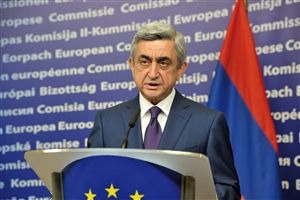Armenia Places Its First Eurobonds
Haroutiun Khachatrian (the 02/10/2013 issue of the CACI Analyst)
The Armenian government has recently faced much criticism making the case that it has lost its ability to take decisions independently. This is a reaction to the September 3 statement of Armenia’s President Serzh Sargsyan, who said his country was seeking to join the Russia-led Customs Union, thus destroying the results of four years of negotiations with the EU over an Association Agreement, which would have been finalized at the Eastern Partnership summit in Vilnius in November. Sargsyan’s move was widely interpreted as a result of Russian pressure on a small and weak country that needs support in many areas.
“CACI Analyst, September 18, 2013”
Armenia Chooses Customs Union over EU Association Agreement
By Armen Grigoryan (the 18/09/2013 issue of the CACI Analyst)
After nearly four years of negotiating the Association Agreement with the EU, Armenian president Serzh Sargsyan made an abrupt turn, announcing his intention to instead join the Customs Union with Russia, Belarus, and Kazakhstan. It is not possible to combine the two frameworks because of contradicting tariff regulations. Sargsyan’s statement was made after increased political and economic pressure from Russia in recent months. Armenia’s participation in Russia-led integration projects will imply very limited possibilities for cooperation with the EU. It will also result in Armenia’s deeper isolation and cause additional complications for the Nagorno-Karabakh conflict resolution process.

Will Georgia Follow Armenia's Path Towards Eurasian Union?
By Archil Zhorzholiani (the 18/09/2013 issue of the CACI Analyst)
On September 4, Georgian Prime Minister Bidzina Ivanishvili stated that Georgia could join the Russia-sponsored Eurasian Union if this would benefit the country’s interests.
Azerbaijan Applies for PACE Resolution on The Sarsang Reservoir in Nagorno-Karabakh
By Bakhtiyar Aslanov ( the 04/09/2013 issue of the CACI Analyst)
The Sarsang water reservoir is one of the highest reservoirs supplying Azerbaijan with water and is located in the Nagorno-Karabakh region, controlled by Armenia. It is located at an altitude of 726 meters above sea level with a dike of 125 meters and a capacity to hold 560 million cubic meters of water. The reservoir was built in 1976 on the Tartar River and extends across 14.2 square kilometers in the area of Aghdere. Sarsang is said to provide 40-60 percent of the unrecognized Nagorno-Karabakh Republic’s electric energy and is operated by the Artsakh HEK OJSC electric company. It has the capacity to provide irrigation water for 100,000 hectares of agricultural land in six rayons in Azerbaijan, Tartar, Agdam, Barda, Goranboy, Yevlakh and Aghjabadi.





 Book S. Frederick Starr and Svante E. Cornell,
Book S. Frederick Starr and Svante E. Cornell,